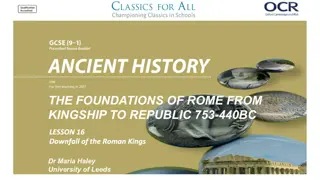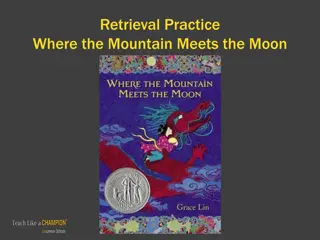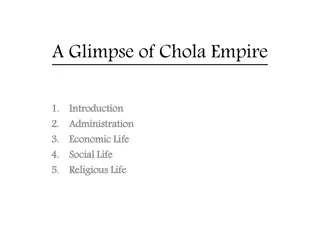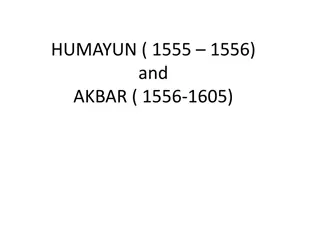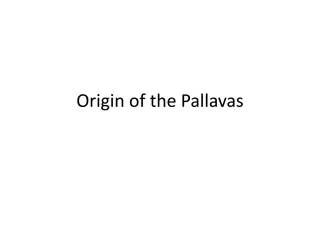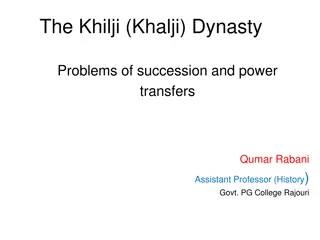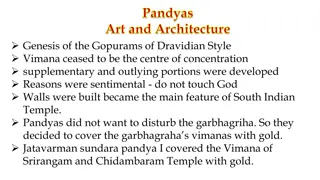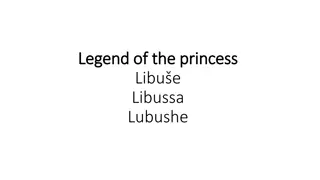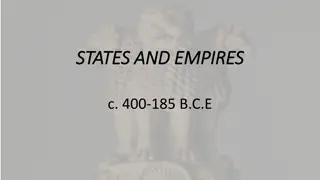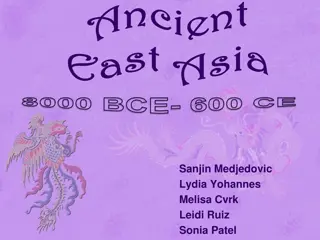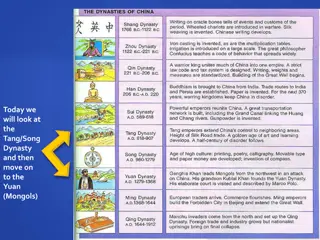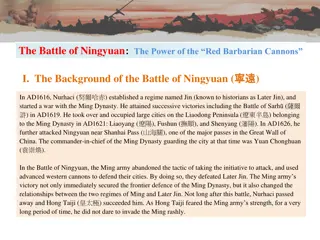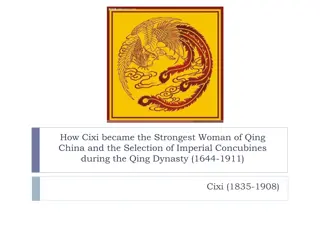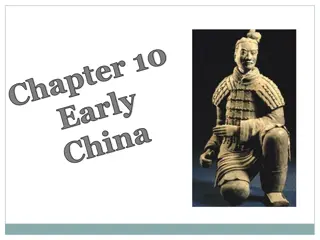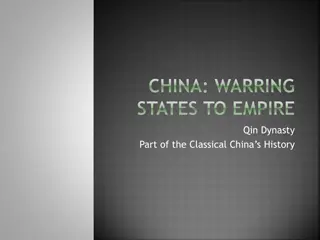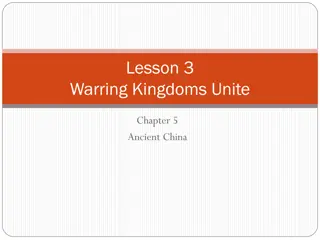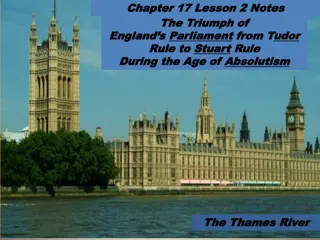The English Civil War and the Rise of the Stuart Dynasty
The English Civil War marked the end of the Tudor dynasty and the rise of the Stuart Dynasty in England. It was a time of conflict between the monarchy and Parliament, with issues revolving around divine right, religion, and political power. Leaders like James I and Charles I faced opposition from P
0 views • 13 slides
The Downfall of the Roman Kings: Lucretia's Role in Establishing the Republic
The Rape of Lucretia by Sextus Tarquinius was a key event leading to the downfall of the Roman kings and the establishment of the Republic. Lucretia's character, representing chastity and virtue, inspired Brutus to take a stand against the tyrannical rulers. Brutus's impassioned speech and vow marke
0 views • 6 slides
Retrieval Practice for Where the Mountain Meets the Moon
In this retrieval practice exercise based on the book "Where the Mountain Meets the Moon," students are quizzed on key aspects such as the symbolism of goldfish, the concept of dynasty, folktale definitions, characters connected to dynasties, and traits like impulsiveness in the story. The practice
0 views • 18 slides
A Glimpse of Chola Empire: Rise and Fall of an Ancient Dynasty
The Chola Empire, under rulers like Vijayalaya, Aditya I, and Rajaraja I, witnessed periods of expansion, conquests, and cultural advancements. Their efficient administration, economic prosperity, social structure, and religious practices are discussed, highlighting the empire's zenith under Arumoli
0 views • 11 slides
The Architectural Marvels of Djoser's Pyramid Complex
The Third Dynasty marked a new era with the reign of Djoser, initiating the age of pyramids. Imhotep, Djoser's vizier, pioneered pyramid building leading to the iconic Giza pyramids. Djoser's pyramid complex at Sakkara showcased unique designs symbolizing the Two Lands of Egypt he ruled. The signifi
0 views • 8 slides
The Mughal Emperors Humayun and Akbar: A Legacy of Conquest and Diplomacy
Humayun, though not a skilled general, was kind and learned, while Akbar, one of the greatest monarchs of India, expanded the Mughal Empire through military conquests and strategic alliances with the Rajputs. Akbar's policy of religious tolerance and Rajput integration left a lasting impact on the M
0 views • 21 slides
The Pallavas: Origins, Politics, and Achievements
The Pallavas, an ancient dynasty in South India, had multiple theories surrounding their origin, with some suggesting Persian descent. Their political history saw conflicts with the Chalukyas and a focus on military conquests. Notable rulers like Mahendravarman I and Narasimhavarman I expanded the P
0 views • 7 slides
Challenges of Power Transfer in the Khilji Dynasty
The death of Balban marked the emergence of Khalji power in the dynasty, leading to economic stabilization and increased market towns. However, internal issues such as the reduction of qualified officers and lack of competent successors arose. Balban's harsh punishments and centralized rule also con
0 views • 18 slides
Exploring the Chinese Three Perfections: Poetry, Calligraphy, and Painting
Scholars from the Tang period through the Ming era in China highly esteemed the three perfections – poetry, calligraphy, and painting. Calligraphy, considered the highest art form, reveals a person's nature. Poetry, akin to painting with sound, was crucial during the Tang dynasty. Painting, often
3 views • 14 slides
Transfer of Capital by Muhammad bin Tughlaq - Controversial Decision
In 1327 A.D., Muhammad bin Tughlaq ordered the transfer of the capital from Delhi to Devagiri (Daultabad), a decision met with controversy. Factors such as strategic military considerations, administrative convenience, and personal dissatisfaction influenced this significant move. Ibn Batuta's accou
0 views • 11 slides
Pandya Architecture: Evolution and Splendor in South India
Pandyas, an ancient South Indian dynasty, innovated the Dravidian architectural style by focusing on gopurams while covering vimanas with gold to respect the sanctity of the garbhagriha. Their cave temples, structural marvels, and intricate paintings exemplify their rich artistic heritage.
2 views • 7 slides
The Art of the Abbasid Period: A Golden Age of Islamic Culture
The Abbasid Dynasty (750-1258 A.D.) marked a golden age in Islamic history, with Baghdad and Samarra as key cultural centers. This era saw the emergence of a distinctive art and architecture style characterized by arabesque designs, mosaics, aniconism, calligraphy, and beveled motifs. These features
0 views • 22 slides
The New South and The Bourbon Triumvirate in Georgia Politics
The New South movement aimed to diversify agriculture and expand industries beyond cotton production in a post-Civil War era. The Bourbon Triumvirate, comprising Joseph E. Brown, Alfred H. Colquitt, and John B. Gordon, exerted political influence in Georgia, promoting industrial development and whit
0 views • 68 slides
The Legendary Princess Libuše and the Founding of Prague
Libuše, the wise daughter of Czech ruler Krok, predicted the glory of Prague and became the ruler after her father. Despite challenges, she married the ploughman Přemysl and their descendants continued the Přemyslid dynasty in Czech lands.
0 views • 5 slides
Experience the Magical Pingxi Sky Lantern Festival in Taiwan
Immerse yourself in the enchanting Pingxi Sky Lantern Festival, a tradition dating back over two thousand years to the Xing Dynasty. Held in February in the rural district of Pingxi, Taiwan, this festival allows people to write their wishes on lanterns and release them into the night sky, creating a
0 views • 5 slides
Discover the Excellence of Bulleit Frontier Whiskey
Bulleit Frontier Whiskey stands out for its high rye content, bold and spicy character, smooth finish, and use of limestone-filtered water. The brand offers a variety of award-winning expressions like Bulleit Bourbon, Bulleit Rye, and Bulleit 10 Years Old, each with distinctive tasting notes and a c
0 views • 5 slides
Rise of States and Empires in Ancient India
Explore the emergence and consolidation of power under the Mauryan Dynasty in ancient India, focusing on key figures like Ashoka and significant historical developments such as the shift eastward in intellectual and political life. Discover the richness of sources detailing the period's political, e
0 views • 19 slides
Efficient Data Lookup and Indexing Techniques in Systems
This content delves into advanced indexing methods for optimized data lookup in systems. It discusses linear and binary search algorithms, data structures for efficient lookups, the concept of learned indexes, and challenges to implementing learned indexes. It also introduces Bourbon, a learned inde
1 views • 16 slides
Ancient East Asia: Foundations and Dynasties
Ancient East Asia, spanning from 8000 BCE to 600 CE, witnessed the rise of influential figures like Yao, Shun, and Yu, who laid the groundwork for Chinese society. The Xia, Shang, and Zhou dynasties brought about unified rules and advancements in metallurgy and governance. Notable thinkers such as C
0 views • 20 slides
Discovering Japan: Land of the Rising Sun and Rich Traditions
Japan, an archipelago in East Asia, boasts a unique geography with mountainous terrain and limited farmland, leading to innovative farming techniques. Surrounded by seas, Japan's isolation protected it while facilitating trade. Early Japanese traditions emphasize clan divisions, the Yamato dynasty,
2 views • 44 slides
Rise and Legacy of the Mongol Empire
The rise of the Mongol Empire under Genghis Khan, the unification of Mongols, conquests, and the establishment of the Yuan Dynasty by Kublai Khan are highlighted. The Mongols' military prowess, organizational skills, and cultural adaptability led to the largest land empire in history. The Pax Mongol
0 views • 11 slides
The Rise and Fall of the Bourbon Triumvirate in Georgia
The Bourbon Triumvirate, consisting of Joseph E. Brown, Alfred H. Colquitt, and John B. Gordon, dominated Georgia politics in the late 19th century. They aimed to strengthen economic ties with the North, develop industry, and uphold Southern traditions. However, their era ended with the rise of the
0 views • 15 slides
Evolution of Banking Industry: From Origins to Modern Challenges
Explore the history and evolution of the banking industry from its early origins, such as the banking practices in ancient Sumeria and Song Dynasty China, to the establishment of modern banking systems in Italy and the UK. Learn about the key characteristics of banks, the role of interest rates, the
0 views • 22 slides
The Battle of Ningyuan: Victory and Strategic Impact in AD 1626
Nurhaci's Later Jin regime clashed with the Ming Dynasty in the Battle of Ningyuan in AD 1626, resulting in a Ming victory due to innovative use of western cannons. This crucial battle secured the Ming frontier defense and altered the power dynamics between the two regimes significantly. Nurhaci's s
0 views • 27 slides
Selection of Imperial Concubines in Qing China: A Detailed Overview
Explore how Cixi became the most powerful woman in Qing China and the intricate process of selecting imperial concubines during the Qing Dynasty. Learn about the criteria, participants, and step-by-step journey these girls undertook for a chance to enter the Forbidden City.
0 views • 25 slides
Insights from the War of Spanish Succession (1702-1713)
The War of Spanish Succession (1702-1713) marked Louis XIV's final war, reflecting a complex political landscape in Europe. The conflict arose due to the declining power of Spain, with the last Hapsburg monarch, Charles II, facing challenges of inbreeding and mental deficiencies. The struggle for co
0 views • 20 slides
Exploring China's Dynasties and Cultural Contributions
Ming Dynasty marked by agricultural reforms, Confucian revival, and Zheng He's voyages; Qing Dynasty's rule following Manchu invasion with emphasis on Confucian beliefs and economic reforms; Chinese inventions and zodiac as part of rich cultural heritage. Policy of isolationism led to limited Europe
0 views • 15 slides
Georgia Studies Week at a Glance: March 15-19, 2021
Explore the week-long lesson plan for Georgia Studies with a focus on evaluating key political, social, and economic changes during the New South Era. Dive into activities that cover historical figures, events, and movements shaping Georgia's history, including the Bourbon Triumvirate, Henry Grady,
0 views • 6 slides
Unveiling the Mysteries of Tutankhamun: A Journey into Ancient Egypt's Pharaoh Dynasty
Delve into the enigmatic life and death of Tutankhamun, the last ruler of the powerful Pharaoh Dynasty in ancient Egypt. Uncover the intrigue surrounding his tomb, the curse that shrouded his legacy, and the beliefs in life after death that guided the pharaohs' burials. Explore the vocabulary, image
0 views • 12 slides
The Tudor Dynasty (1485-1603): Key Events and Figures
The Tudor Dynasty (1485-1603) marked significant events in English history, including the rise of the powerful English naval fleet, acquisition of colonies, birth of the mercantile bourgeoisie, break with the Catholic Church, and spread of the Reformation spirit. Economic changes saw the transition
0 views • 5 slides
Evolution of Bourbon and Beer Coproducts in Kentucky
The article explores the deep-rooted traditions of corn liquor and beer production in the Ohio River Valley, highlighting key players like Jacob Beam and George Wiedemann. It delves into the booming trend of craft distilling since 1995, elucidating the rise in bourbon production and the resulting in
0 views • 28 slides
Exploration and Isolation: Ming Dynasty's Impact
Ming Dynasty of China, under rulers like Yonglo and Zheng He, embarked on significant exploratory voyages to Southeast Asia, India, Arabia, and eastern Africa. These voyages showcased Chinese superiority through massive fleets and distribution of gifts. However, internal pressures led to the end of
0 views • 12 slides
Ancient China: Birth of Civilization and Shang Dynasty
People in ancient China settled along the Huang He and the Chang Jiang rivers, utilizing the fertile soil for agriculture. The region's geographic features, including mountains and deserts, limited interactions with other civilizations. Myths and legends surround the early history, with Y the Great
0 views • 18 slides
Insights into Ashoka: The Emperor Who Embraced Peace
Explore the legacy of Ashoka, an influential ruler in history known for his transition towards peace, as seen through his inscriptions and the Mauryan Dynasty. Discover the difference between kingdoms and empires, the significance of dynasties, and the administration in Ashoka's vast empire. Learn a
0 views • 10 slides
Decline and Rise: The Ming Dynasty and Zheng He's Voyages
The decline of the Yuan Dynasty marked by corruption and peasant rebellions led to the rise of the Ming Dynasty under Ming Hongwu. The Ming Dynasty brought stability through centralized governance, civil service exams, and land redistribution. Yung Lo, also known as Yongle, expanded China and sponso
0 views • 9 slides
Rise and Rule of the Qin Dynasty in Ancient China
The Qin Dynasty emerged from the chaos of the Warring States period with the goal of unifying and expanding China under the leadership of Shi Huangdi. The dynasty implemented legalism as a political philosophy, emphasizing clear rules and harsh punishments to enforce state authority. Shi Huangdi exe
0 views • 12 slides
Ancient China: Rise of the Qin Dynasty under Shi Huangdi's Rule
Explore the history of Ancient China as Shi Huangdi conquers warring kingdoms to unify the land. Discover how he became China's First Emperor, strengthened the empire, organized the government, and built the Great Wall for protection. Learn about the legacy and impact of the Qin Dynasty in shaping C
0 views • 25 slides
The Evolution of English Parliament under Tudor and Stuart Rule
The Tudor dynasty, starting with Henry VII, laid the foundation for parliamentary power by involving Parliament in decision-making processes. Henry VIII sought Parliament's approval for the Act of Supremacy, making the monarch head of the Church of England. Elizabeth I further unified the Church by
0 views • 11 slides
The Tudor Dynasty: Henry VIII, Reformation, and the Creation of the Church of England
Explore the rich history of the Tudor dynasty with a focus on Henry VIII, the Protestant Reformation in Europe, and the pivotal creation of the Church of England. Learn about key events such as Henry VIII's marriages, his quest for a male heir, the beginnings of Protestantism in England, and the est
0 views • 11 slides
Child & Family Wellbeing Indicators Report 2015 Overview
This report presents indicators of child and family wellbeing based on the 2015 findings, aiming to aid government officials, policymakers, and community leaders in understanding the state of child and family wellbeing in Kansas counties. The report provides insights on 18 key indicators, including
0 views • 69 slides

